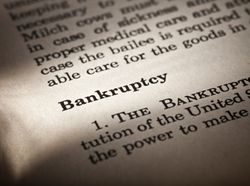If you and your spouse are still facing piling debt, you may be thinking about bankruptcy. However, since money issues are often the cause of divorce, you may also be thinking about splitting up as well. This dilemma leads to the question: Should you file bankruptcy now, or wait until after you split?
First, you should know that it is possible to file bankruptcy separately even if you are still married. This is often best for couples who know they are about to split and don’t think they can work well together during their joint bankruptcy. The rules differ for spouses who are still cohabitating as opposed to those who have separated, so *talk with an attorney to figure out what’s best for you.
However, if you and your spouse believe you can work together during the bankruptcy, it might make sense to file bankruptcy before your divorce. Only married couples can file jointly, and it helps keep down numerous costs. Filing bankruptcy prior to the divorce may effect alimony payments and other divisions of assets during the divorce process. Keep in mind, however, it is not always possible to discharge certain spousal payments such as alimony or child support payments in divorce. To find out which situation will be best for you, call a Jacksonville Bankruptcy Attorney.
 Jacksonville Bankruptcy Lawyer Blog
Jacksonville Bankruptcy Lawyer Blog



 Yes, if it is a non-priority debt. Taxes become non-priority debt when 1. the return was due more than 3 years prior to filing the bankruptcy 2. the return was filed at least 2 years before you filed for bankruptcy 3. the tax debt was assessed at least 240 days prior to filing AND 4. you are not guilty of any type of fraudulent behavior, like tax evasion. Also, you cannot have signed a settlement agreement with the IRS. This can be an in-depth analysis, so it is best to have
Yes, if it is a non-priority debt. Taxes become non-priority debt when 1. the return was due more than 3 years prior to filing the bankruptcy 2. the return was filed at least 2 years before you filed for bankruptcy 3. the tax debt was assessed at least 240 days prior to filing AND 4. you are not guilty of any type of fraudulent behavior, like tax evasion. Also, you cannot have signed a settlement agreement with the IRS. This can be an in-depth analysis, so it is best to have